Body Lotion Market Research, 2032
The global body lotion market was valued at $56.4 billion in 2022, and is projected to reach $85.3 billion by 2032, growing at a CAGR of 4.3% from 2023 to 2032.
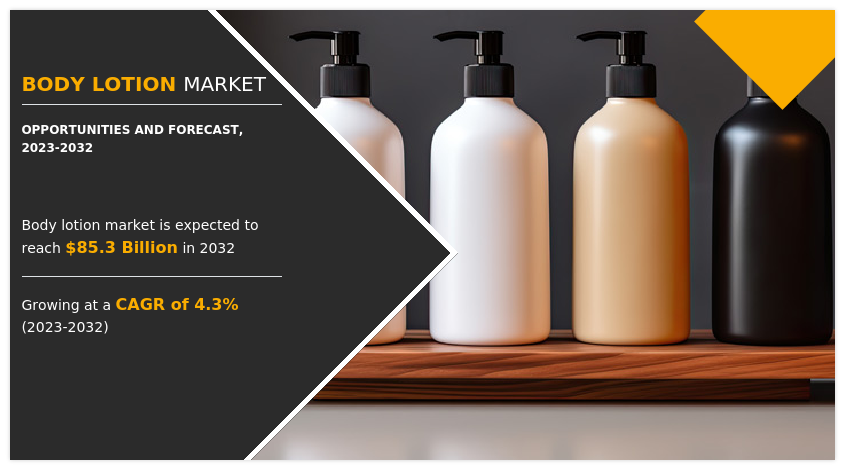
Market Dynamics
The body lotion industry encompasses a wide range of products designed to moisturize & nourish the skin, catering to diverse consumer needs. This market includes offerings from various brands, including natural, organic, and specialty formulations. Key drivers of its growth include increase in awareness of skincare, rise in disposable incomes, and change in consumer lifestyles. Moreover, it caters to a broad demographic, from health-conscious individuals seeking natural options to those desiring luxurious or therapeutic skincare experiences.
Change in lifestyles characterized by urbanization, increase in pollution, and hectic routines have led to greater skin-related concerns. These factors contribute to dry & stressed skin, prompting a surge in demand for body lotions. Consumers seek skincare solutions to combat these issues, making body lotions a vital part of their daily grooming regimen. As a result, the body lotion industryexperiences growth due to the need for skin hydration & protection in modern lifestyles.
Sustainability is another major factor which has largely affected numerous industries, including personal care. This is due to rise in awareness among consumers about the impact of their purchases on the environment and consistent depletion of natural resources. Brands are increasing their focus on reducing microplastic pollution, water wastage, and addressing rise in awareness about animal cruelty. The market has witnessed numerous innovations to address body lotion market demand and led manufacturers to adopt sustainability-oriented production processes. Products based on organic and natural ingredients are rising in popularity due to being environmentally friendly and chemical-free. Men and women are more drawn toward using personal care and cosmetics, that are produced without using synthetic materials these products further allow consumers to reduce their carbon footprint.
Body lotion market growth is significantly impacted by the advancements in distribution channels, which have integrated various cutting-edge technologies to elevate the overall consumer shopping experience, both in physical stores and online platforms. With the incorporation of artificial intelligence and machine learning into stores, mobile apps, and websites, brands can now provide highly personalized products tailored to cater to a diverse range of skin tones and specific skincare needs through improved product recommendations and marketing strategies. In addition, smart sensors are being employed to collect extensive data on skin health, hydration, and UV exposure, which is then harnessed for the more efficient composition of skincare products.
Developing nations in Asia and South America are witnessing a notable surge in body lotion market size. This is primarily attributed to the increase in availability of natural ingredients and rise in emphasis on eco-friendly products, driving market expansion. Many brands are capitalizing on the rich variety of oils & plant extracts from the Amazon Rainforest. For instance, Natura &Co, a leading cosmetics company, offers body lotions infused with natural ingredients such as Tucuma Butter. In Asia, marketing & packaging strategies often highlight organic labels to attract consumers. Furthermore, rise in disposable income levels and financial stability among working women in countries such as Indonesia, India, and many others are major drivers of the growing demand for personal care products. The proliferation of shopping malls and department stores in these regions further offers opportunities to market-imported brands, which are especially favored by the younger generation.
However, the body lotion market faces increased challenges due to escalating government regulations concerning the use of specific ingredients. These regulations vary from one country to another, requiring manufacturers to adhere to distinct ingredient compositions, which adds complexity for both established and emerging companies in the body lotion market share. Considering the substantial R&D costs necessary for inventing new ingredients and the swiftly changing consumer preferences, failure to comply with these regulations can tarnish a brand's image, leading to a diminished consumer base. This prevents companies from fully capitalizing on market opportunities. Furthermore, rapid shifts in consumer demand necessitate brands to continually introduce new products to retain their customer base and remain competitive. Government regulation further complicates product innovation, given the unique requirements of various regulatory compliance.
Segmental Overview
The body lotion market forecast into skin type, end user, packaging distribution channel, and region. By skin type, the market is divided into dry skin, oily skin, normal skin, sensitive skin, and others. As per end user, the market is categorized into male, female, and kids. By packaging, it is segmented into bottle, tube, pump, and others. By distribution channel, it is segmented into supermarket & hypermarket, specialty store, online retail, and others. Region wise, the market is analyzed across North America (the U.S., Canada, and Mexico), Europe (Germany, UK, France, Italy, Spain, Russia, and rest of Europe), Asia-Pacific (China, India, Japan, South Korea, Australia, and rest of Asia-Pacific), and LAMEA (Brazil, Argentina, Chile, South Africa, and rest of LAMEA).
By Type
Based on type, the dry skin segment held the highest market share in 2022, accounting for more the two-fifth of the global Body Lotion Market revenue and is estimated to maintain its leadership status throughout the forecast period. Body lotions are increasingly becoming used to treat dry skin problems, due to the presence of hydrating & moisturizing ingredients, such as hyaluronic acid and ceramides. However, the sensitive skin segment is projected to manifest the highest CAGR of 4.8% from 2023 to 2032. Brands are introducing a variety of new body lotion products to address skin concerns unique to the skin type. Many skincare products use ingredients for infusing fragrances and paraben mix which cause numerous allergies to people with sensitive skin.
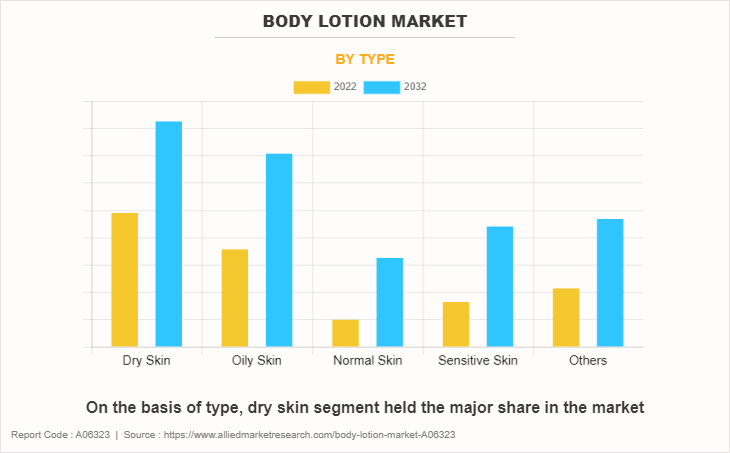
By End User
Based on End User, the female segment held the highest market share in 2022, accounting for nearly three-fifths of the global Body Lotion Market revenue and is estimated to maintain its leadership status throughout the forecast period. As a key consumer demographic, females shape trends, prompting brands to innovate and cater to their ever-evolving skincare needs in this competitive beauty sector. However, the male segment is projected to manifest the highest CAGR of 4.4% from 2023 to 2032. With increase in awareness among males about skincare and adoption of healthier lifestyle are the key trends. Dry skin is men is associated with various causes such as eczema, bringing change in skin color with aging.
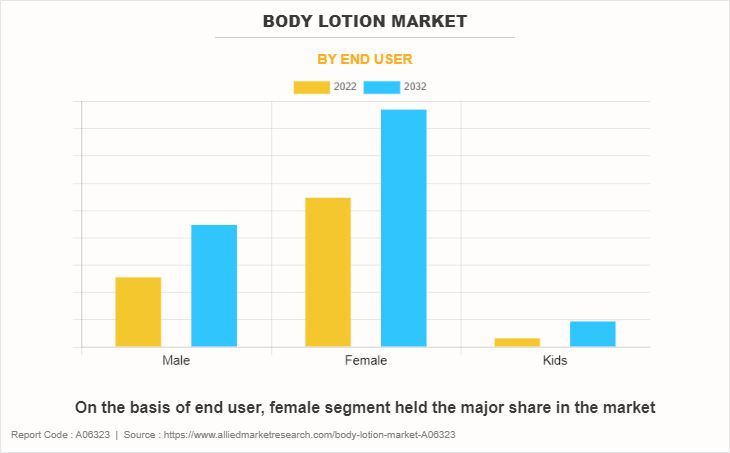
By Packaging
Based on packaging, the bottle segment held the highest market share in 2022, accounting for nearly two-fifths of the global Body Lotion Market revenue and is estimated to maintain its leadership status throughout the forecast period. Bottle body lotion packaging trends include a shift toward sustainable materials, with brands opting for recyclable or eco-friendly bottle options. However, the pump segment is projected to manifest the highest CAGR of 4.8% from 2023 to 2032. Modern body lotion packaging favor pump dispensers for their ease of use and precise dosage. The packaging often incorporates eco-friendly materials, aligning with sustainability goals.
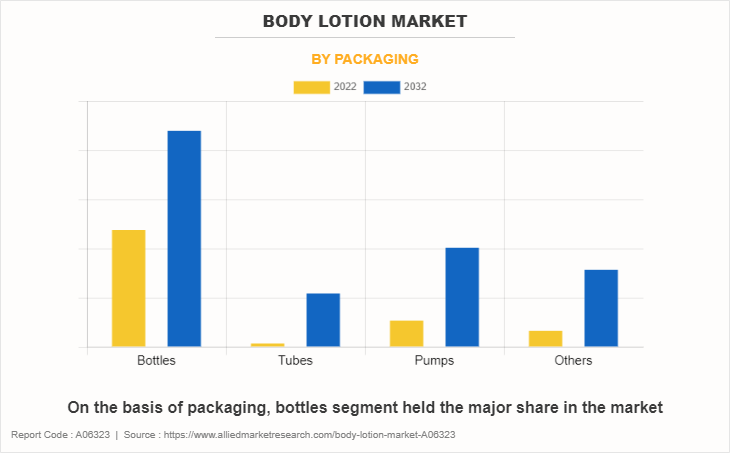
By Distribution Channel
Based on distribution channel, the supermarket and hypermarket segment held the highest market share in 2022, accounting for more than one-third of the global Body Lotion Market revenue and is estimated to maintain its leadership status throughout the forecast period. Hypermarkets & supermarkets are responding by expanding their product offerings to align with these trends, creating dedicated sections for organic & specialty body lotions to meet evolving consumer expectations. However, the online channel segment is projected to manifest the highest CAGR of 4.7% from 2023 to 2032. Online sales channels are becoming an increasingly popular choice owing to the numerous advantages they offer. With advances in technologies and integration of artificial intelligence and machine learning to gather consumer data that enhance their shopping experience, online sales channels help companies increase their consumer relations.
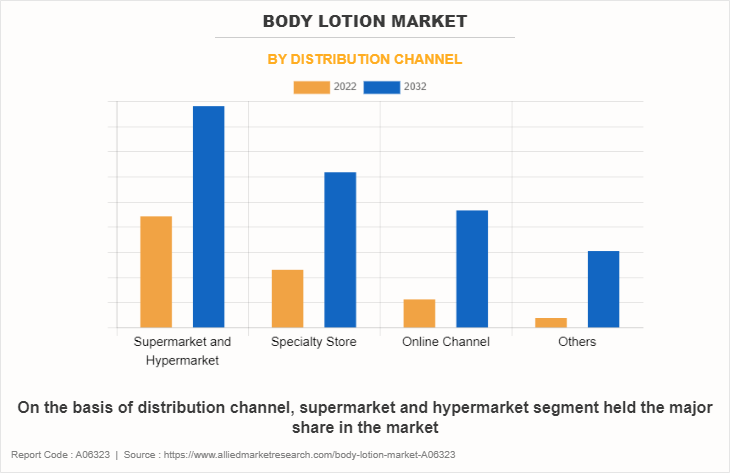
By Region
Based on region, Europe held the highest market share in terms of revenue in 2022, accounting for more than one-third of the global Body Lotion Market revenue in this region. Increase in consumer awareness of skincare routines and the demand for multifunctional body lotions, offering additional benefits such as anti-aging or sun protection, are notable trends. However, the Asia-Pacific region is expected to witness the fastest CAGR of 5.1% from 2023 to 2032. There is surge in demand for personalized and region-specific formulations, reflecting the cultural diversity and preferences within the Asia-Pacific skincare market.
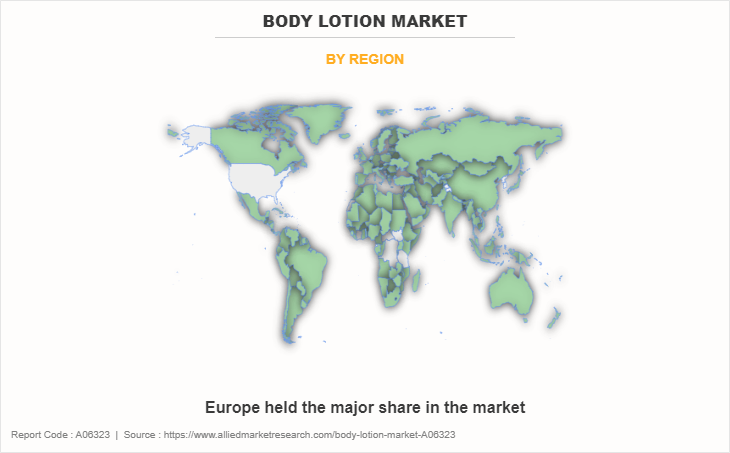
Competition Analysis
The players in the body lotion market have adopted acquisition, business expansion, partnership, collaboration, and product launch as their key development strategies to increase profitability and improve their position in the market. Some of the key players profiled in the market analysis include The Procter & Gamble Company, Groupe Clarins, Hindustan Unilever Limited, The Estee Lauder Companies Inc., Galderma S.A., Beiersdorf AG, Revlon, Inc., Avon Products, Inc, Coty Inc., and Johnson & Johnson Services, Inc.
Recent Developments in the Body Lotion Market
- In 2023, The Estee Lauder Companies Inc. announced opening of its Global Technology Center in Bucharest, Romania for high-touch consumer experiences and high-performance supply chain network, through capabilities in artificial intelligence, cloud acceleration, intelligent automation, and omnichannel, and more.
- In 2022, Beiersdorf AG acquired Chantecaille Beaute Inc., to complements company's portfolio in beauty and skin care, cosmetics and fragrance products that are based on botanical ingredients and further accelerate its growth in the North American and Asian markets.
- In 2022, Groupe Clarins launched new corporate website that provides an optimized digital experience to its customers available in English, French, Spanish, German, and simplified Chinese.
- In 2020, Coty Inc. announced the launch of its brand, Kylie Skin that also offers body lotion at Douglas to expands its product portfolio in Europe.
Key Benefits For Stakeholders
- This report provides a quantitative analysis of the market segments, current trends, estimations, and dynamics of the body lotion market analysis from 2022 to 2032 to identify the prevailing body lotion market opportunities.
- The market research is offered along with information related to key drivers, restraints, and opportunities.
- Porter's five forces analysis highlights the potency of buyers and suppliers to enable stakeholders make profit-oriented business decisions and strengthen their supplier-buyer network.
- In-depth analysis of the body lotion market segmentation assists to determine the prevailing market opportunities.
- Major countries in each region are mapped according to their revenue contribution to the global market.
- Market player positioning facilitates benchmarking and provides a clear understanding of the present position of the market players.
- The report includes the analysis of the regional as well as global body lotion market trends, key players, market segments, application areas, and market growth strategies.
Body Lotion Market Report Highlights
| Aspects | Details |
| Market Size By 2032 | USD 85.3 billion |
| Growth Rate | CAGR of 4.3% |
| Forecast period | 2022 - 2032 |
| Report Pages | 300 |
| By Type |
|
| By End User |
|
| By Packaging |
|
| By Distribution Channel |
|
| By Region |
|
| Key Market Players | Beiersdorf AG, Avon Products, Inc, Groupe Clarins, Galderma S.A., Revlon, Inc., Coty Inc., The Procter & Gamble Company, The Estee Lauder Companies Inc., Hindustan Unilever Limited, Johnson & Johnson Services, Inc. |
Analyst Review
According to CXO, there is robust growth in the body lotion market, driven by increase in consumer awareness of skincare, hygiene, and self-care practices. The market expansion is attributed to rise in demand for natural & organic formulations, aligning with the global trend toward clean beauty. The dynamics are characterized by a shift in consumer preferences toward multifunctional products, incorporating features such as UV protection and anti-aging benefits. The market is further influenced by technological advancements in product formulations & innovative packaging solutions. E-commerce platforms play a pivotal role in market dynamics, offering a convenient avenue for consumers to explore & purchase a diverse range of body lotions, further fueling market growth.
Increase in awareness toward body care are the upcoming trends of Body Lotion Market in the world
Dry skin is the leading type of Body Lotion Market
Europe is the largest regional market for Body Lotion
Body Lotion Market to Reach $85,316.4 million, Globally, by 2032 at 4.3% CAGR
• Procter & Gamble Company • Groupe Clarins • Hindustan Unilever Limited • The Estee Lauder Companies Inc. • Galderma S.A. • Beiersdorf AG • Revlon, Inc. • Avon Products, Inc • Coty Inc. • Johnson & Johnson Services, Inc.
Loading Table Of Content...
Loading Research Methodology...



